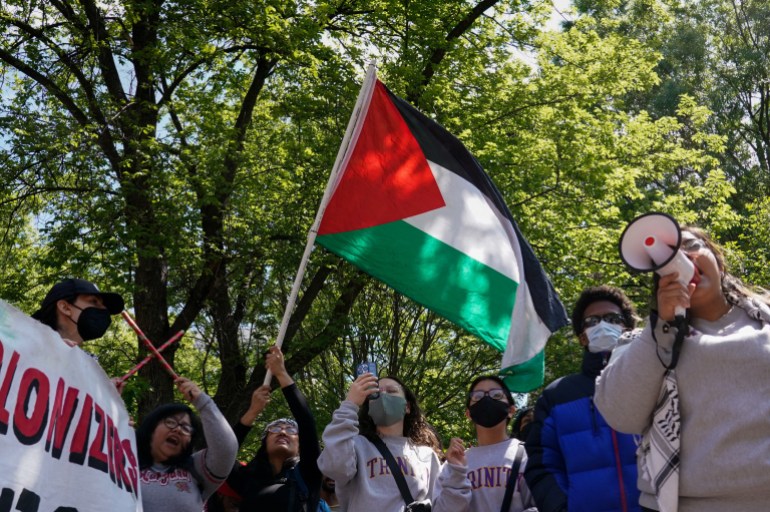Washington DC – Experts say the Gaza-centered campus protest movement in the U.S. has highlighted a generational gap in Israel and that young people are demonstrating a willingness to challenge politicians and college administrators across the country.
They argue that the gap in opinion, in which younger Americans are generally more supportive of Palestinians than previous generations, poses a risk to the re-election prospects of 81-year-old Democratic President Joe Biden.
It could also threaten the bipartisan support Israel enjoys in Washington.
“We are already seeing evidence of a generational divide in Israel, and this will be a long-term problem for Democrats.” said Omar Wasow, assistant professor of political science at the University of California, Berkeley.
Wasow told Al Jazeera: “These protests accelerate the generation gap.
Students at Columbia University in New York set up a Palestine solidarity camp last week and were subject to arrests and other disciplinary action after the university administration asked police to crack down on protests.
But despite the crackdown, similar encampments emerged across the United States and in other countries.
Videos showing students, professors and journalists being violently detained by police officers on several campuses sparked outrage but did little to slow the momentum of the ongoing protests.
‘A moment of inflection’
Students are loudly demanding that the university disclose its investments and withdraw funds from arms manufacturers and companies linked to the Israeli military.
Politicians from major U.S. political parties, the White House and pro-Israel groups have accused the students of promoting anti-Semitism, a charge vehemently denied by the protesters.
Young people are increasingly frustrated with the status quo on domestic and foreign policy issues, said Eman Abdelhadi, a sociologist at the University of Chicago.
“I think there is a lot of dissatisfaction with the older generation,” Abdelhadi said. But more importantly, they are dissatisfied with the system they operate in.”
She added that the protests signaled a broader “inflection point” in American public opinion.
“Generally in American history, major changes in public opinion have coincided with or been triggered by large-scale student movements,” Abdelhadi told Al Jazeera.
She said campus activism can be the basis for political change. “There’s kind of a sense that this is the future.”

Biden’s concerns
For years, public opinion polls in the United States have shown that young people are more likely to be sympathetic to Palestine and more likely to be critical of Israel.
But Americans have become more critical overall of Israel’s treatment of Palestinians, including the ongoing war in Gaza.
Multiple opinion polls have shown that a majority of U.S. respondents support a permanent ceasefire in the besieged Palestinian territory, where Israel has killed more than 34,000 Palestinians since the conflict broke out on October 7.
However, Biden has maintained firm support for Israel, America’s top Middle East ally, even during the war.
The 81-year-old president’s stance could be politically costly. That’s because Biden faces a tough re-election challenge when he is expected to face off against his Republican predecessor, Donald Trump, in the November election.
Polls show Biden will have to appeal to the Democratic base, which is not as united in its support of Israel as Republicans.
Angus Johnston, a historian of the American student movement, explained that the generation gap in Israel is particularly pronounced among Democrats.
“At the national level, we have been seeing this for some time as a disconnect between young voters and the values of most Democratic politicians,” Johnston told Al Jazeera.
“And what we’re seeing now is a similar disconnect between the young people on campus and the many administrators, alumni and donors who run this campus.”
Abdelhadi, the sociologist, added that the heavy-handed approach to law enforcement against the Gaza solidarity protests undermined Democrats’ argument that electing Biden would protect the country from Trump, whom they accuse of authoritarianism.
“The reality is that the Democratic Party has been telling us that young people need to save democracy, people of color need to save democracy, and all the problems with the current government need to be put aside,” she told Al Jazeera. .
“But where is democracy when state police beat students and faculty for protesting and the White House says nothing about it?”
Wasow also said protests and crackdowns against them could add to apathy toward Biden.
“Democrats cannot afford to give people more reasons to vote against Biden, and this is really one thing.”
policy change
But student protesters are not engaging in partisan politics in the United States. Instead, they emphasized that their demands aim to help protect the human rights of Palestinians.
So can the protests help bring about a change in U.S. policy and achieve their demands for a divestment?
Historian Johnston said it is unlikely that U.S. universities will divest from large corporations and the defense industry in the near term, but calls for investment transparency are reasonable.
He added that long-term change is possible, but it won’t happen overnight.
“We’ve seen over and over again that student organizations don’t always change policies quickly, and they don’t always change them in the way students want,” said Johnston.
“But we know that student organizing, when it reaches a certain intensity, can have a significant effect.”
For example, he said the university movement against apartheid in South Africa began in the 1950s and grew over the years.
“I think there is no doubt that anti-apartheid campus organizing in the 1980s played an important role in changing American public opinion and political opinion about the South African regime,” he said.
Mr. Wasow, who studied civil rights protests in the 1960s, said protests can help change public opinion, grow political coalitions around specific causes and build civic capacity to advance issues.
“What’s happening now may not lead to any kind of policy change, but I think it will continue to have long-term impacts if younger generations develop some kind of civic capacity for activism on these issues.”
